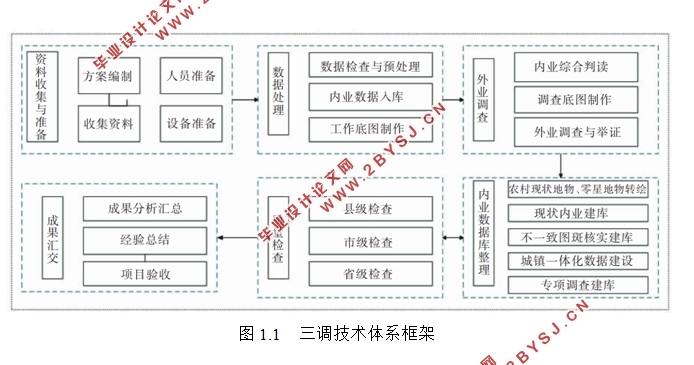某地基市第三次全国土地调查监理
无需注册登录,支付后按照提示操作即可获取该资料.
某地基市第三次全国土地调查监理(论文15000字)
摘 要
第三次全国国土调查采用卫星遥感、实地调查、在线举证、互联网数据共享等技术手段,在二调成果的基础上进行内容全面细化、更新及补充工作。在调查过程中增加了外业举证这一环节,国家可以在线举证现场核实图斑地类。
以第三次全国国土调查的相关研究为基础,通过参加某地级市第三次全国国土调查项目监理工作获得的实践经验,结合该市的其他土地调查资料和三调项目成果,对此次某地级市的第三次全国国土调查项目中出现的技术问题和工作问题进行总结、分析和探讨。
城镇村内部土地利用现状调查并不彻底,业主单位对细化工作态度抵触,大量村庄内部的,达到最小上图面积的耕地、林地、草地和坑塘并未上图。细化工作对建设用地面积影响非常大,区县级调查成果显示,城镇村内部细化出来的农用地和未利用地的面积接近五千公顷。
作业单位的外业调查人员专业素质不过关,造成大量的地物丢漏、地类判定错误,外业举证照片质量不合格,内业同步上图工作不及时,导致了后期的大量返工工作。
土地权属调查工作进行到组级时会增加调查工作的复杂度,需要各地方的村级干部全力配合调查工作。作业单位在调查过程中必须对不明显界线实地测量精准点位,避免后期内业上图错误。
对比于二调的三大类占比,三调的三大类占比中,建设用地和农用地的占比全部下降,未利用地占比上升;对比于二零一七年土地年度变更调查,三调的建设用地与农用地的面积少量增加,未利用地则减少三分之一。
省级核查结果反馈主要有抽查结果,城镇村及图斑边界检查结果,自动筛选结果三项。抽查结果主要反馈的是地类认定错误问题;边界检查结果主要反馈的是图斑边界衔接问题,但是错误数量较少;自动筛选结果主要反馈的是地类重叠图斑问题。
关键词:第三次全国国土调查 城镇村内部土地利用现状调查 外业举证 三大类 建设用地
Abstract
The third national land survey uses satellite remote sensing, field survey, online evidence, Internet data sharing and other technical means to comprehensively refine, update and supplement the content on the basis of the second-level results.In the course of the investigation, the field certification was added, and the country can verify the maps on the spot.
Based on the relevant research of the third national land survey, the practical experience gained by participating in the supervision work of the third national land survey project of a prefecture-level city, combined with the other land survey data and the results of the three-tone project of the city.The technical problems and work problems in the third national land survey project of a prefecture-level city are summarized, analyzed and discussed.
The investigation of the status quo of land use within urban villages is not thorough. The owners' units have a negative attitude towards the refinement work. Within a large number of villages, the cultivated land, woodland, grassland and pit ponds that have reached the minimum map area are not on.The refinement work has a great impact on the construction land area. The results of district and county-level surveys show that the area of agricultural land and unused land refined within urban villages is close to 5,000 hectares.
The professional quality of the field survey personnel of the operating unit is not good enough, resulting in a large number of ground objects leaking, land type judgment errors, unqualified photo quality in the field, and the internal industry synchronization is not timely, resulting in a large number of later rework work.
When the land ownership survey is carried out to the group level, the complexity of the investigation work will be increased, and village-level cadres at all localities will be required to fully cooperate with the investigation work.In the course of the investigation, the operating unit must measure the precise position on the field with no obvious boundary to avoid the mistakes in the later industry.
Compared with the proportion of the three categories of secondary adjustment, the proportion of construction land and agricultural land decreased, and the proportion of unused land increased in the proportion of the three categories of three adjustments; compared with the land in 2017.In the annual change survey, the area of construction land and agricultural land in three adjustments increased slightly, and the unused land decreased by one-third.
The results of provincial-level verification results mainly include the results of random inspections, the results of urban villages and map boundary inspections, and three automatic screening results.The main result of the spot check is the error of the land type identification; the main result of the boundary check is the boundary of the map boundary, but the number of errors is small; the main result of the automatic screening is the overlapping problem of the ground class.
Keywords: the third national land survey, urban villages, land use, status quo, external industry, evidence, three categories, construction land

目录
摘 要 I
Abstract II
第一章 绪论 1
1.1 引言 1
1.2 研究背景 2
1.3 研究现状 3
1.4 文章结构 3
第二章 安徽省三调技术问题探讨与研究 5
2.1 外业类 5
2.1.1 新增地物调查 5
2.1.2 城镇村内部调查 5
2.1.3 地类变化图斑调查 6
2.1.4 批而未建图斑调查 6
2.1.5 不一致图斑调查 6
2.2 权属类 7
2.3 内业类 7
2.3.1 地类判读 7
2.3.2 图斑勾绘 10
2.3.3 线状地物上图 12
2.3.1 城镇村内部图斑上图 13
2.4 本章小结 15
第三章 江苏省三调技术问题探讨与研究 16
3.1 资料收集与利用 16
3.1.1 资料收集 16
3.1.2 资料利用 16
3.2 基础资料处理 17
3.2.1 地类编码转换 17
3.2.2 线状地物上图 17
3.3 外业与地类认定 18
3.3.1 地类认定调查 18
3.3.2 城镇村内部调查 18
3.3.3 外业举证 19
3.4 权属调查 19
3.4.1 权属界线转绘 19
3.4.2 组界调查 19
3.5 内业与数据库汇总分析 19
3.5.1 图斑勾绘 19
3.5.2 城镇村内部细化 20
3.6本章小结 20
第四章 三调工作成果分析及工作问题探讨 21
4.1 城镇村内部细化 21
4.2 外业举证 22
4.3 三大类流量变化 23
4.3.1 农用地 23
4.3.2 建设用地 24
4.3.3 未利用地 24
4.4 三大类占比分析 25
4.5 省级核查 27
4.5.1 抽查结果 27
4.5.2 城镇村及图斑边界检查结果 28
4.5.3 自动筛选结果 28
4.6本章小结 30
第五章 总结与展望 31
5.1 工作结论 31
5.2 工作展望 32
参考文献 34
致谢 36
